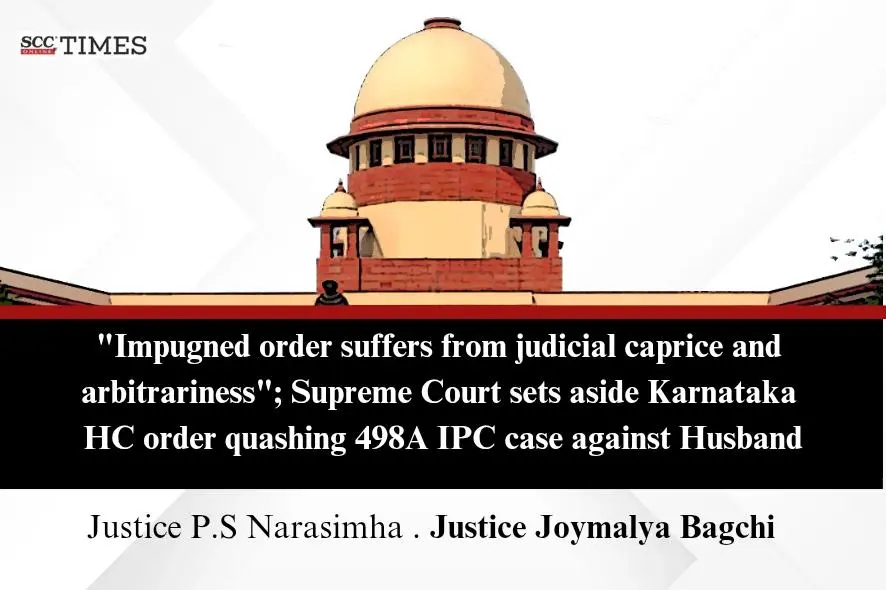Supreme Court: In a criminal appeal filed against the order passed by the Karnataka High Court, order whereby the High Court quashed proceedings for offences under Sections 498-A, 324, 355, 504, 506 read with Section 149 of the Penal Code, 1860 (‘IPC’) against the husband, the division bench of PS Narasimha and Joymalya Bagchi*, JJ. noted that although an earlier order had refused to quash the proceedings against some of the in-laws, the impugned order, quashing the case against the husband, made no reference to this prior decision. The Court found this omission inexplicable and emphasized that it was incumbent upon the Judge to refer to the earlier judgment of the co-ordinate bench and provide reasons for arriving at a different conclusion. Remarking that inconsistent decisions emerging from different benches undermine public trust in the judiciary and reduce litigation to a matter of chance, the Court found that the impugned order suffered from judicial caprice and arbitrariness and, on that ground as well, was liable to be set aside.
Accordingly, the Court set aside the impugned order and directed that the proceedings against the husband be revived and continue in accordance with law.
Background
The case was registered based on a written complaint lodged by the appellant-wife. She alleged that her marriage with the respondent-husband was solemnized in 2012, and they had two children. Over time, the husband developed an illicit relationship with a woman, four months prior to the incident, he had abused the wife in filthy language. Although she approached the Police Station, no formal complaint was registered at that time. She further stated that the husband and his family members harassed her both physically and mentally and demanded a dowry of two lakhs. Owing to this ill-treatment and dowry demand, she began residing at her parental home. On 27-10-2020, the husband and his relatives allegedly arrived at her parental home in a car, threw chilli powder in her eyes, verbally abused her and her relatives in vulgar language, and assaulted them using slippers and stones. The assault was interrupted by Neighbours, who intervened and rescued the wife and her family.
During the investigation, the police recovered slippers and stones from the scene, recorded witness statements, and subsequently filed a charge sheet against the husband and his parents. The in-laws challenged the proceedings before the High Court, which partly allowed the petition by quashing the case against the elderly parents-in-law while allowing it to proceed against the other family members. Later, the husband also sought quashing of the charges, which was granted by another coordinate bench of the High Court. Thus, aggrieved, the wife filed the present appeal.
Analysis and Decision
The Court observed that the case at hand portrayed a disturbing picture. While one judge refused to quash the proceedings against the other in-laws, citing, among other things, that the wound certificate indicated that the wife had been assaulted and had sustained simple injuries, another judge, through the impugned order, quashed the proceedings against the husband. The latter held that the medical certificate was inconsistent with the allegations in the complaint, specifically noting that the certificate did not indicate injuries caused by a blunt weapon. Upon reviewing the impugned judgment, the Court found that the judge had erred in law by conducting an assessment of the credibility of the allegations in the FIR and charge sheet. The judge had compared the description of the assault in the FIR with the wound certificate and concluded that the allegations were untrue. In doing so, the judge effectively conducted a mini trial at the quashing stage, which is impermissible in law.
The Court remarked that “this Court has repeatedly forbidden the High Court from embarking on a ‘mini trial’ in exercise of its inherent jurisdiction to quash proceeding”.
Applying the legal principles laid down in previous judgments, the Court held that the allegation of the husband and other in-laws throwing chilli powder and assaulting the wife was substantiated not only by the wound certificate, indicating simple injury, but also by the supporting statement of a neighbour. In light of this evidence, the Court concluded that the case did not fall within the category of matters where there is either no legal evidence or where the available evidence was manifestly and clearly inconsistent with the allegations in the chargesheet.
The Court noted that it was not in dispute that injuries were noted in the wound certificate, and therefore, the allegation of assault could not be considered patently absurd or inherently improbable. In this context, the Court found it unwarranted for the judge to engage in a mini trial, comparing the ocular version of events with the medical evidence, and subsequently quashing the proceedings. The Court emphasised that whether ocular evidence was fully inconsistent with medical evidence was a matter to be determined at trial and cannot serve as a basis for terminating prosecution at the preliminary stage. Additionally, the judge had noted that it was unclear from the allegations who had perpetrated the assault and suggested that the prosecution, in the midst of a matrimonial suit, amounted to an abuse of the court process. The Court found these grounds equally untenable.
The Court emphasised that the husband and other in-laws (excluding the parents-in-law) were alleged to have acted in concert and conjointly assaulted the wife and her relatives. In such cases, where multiple accused are said to have shared a common intention or object in committing the offence, it becomes irrelevant to pinpoint the exact role of each individual in the assault. The Court noted that the Judge failed to appreciate that the uncontroverted allegations in the chargesheet attracted the principle of constructive liability, and therefore, the proceeding could not be quashed merely on the ground that the specific perpetrator was unclear.
Furthermore, the Court held that the Judge misdirected himself in concluding that the proceeding was malicious and an abuse of the process of court simply because matrimonial proceedings were ongoing. It observed that offences involving cruelty to a wife often stem from matrimonial disputes, and the mere pendency of such proceedings cannot, by itself, justify the inference that the criminal case, especially one supported by medical evidence and an independent witness, was malicious or an abuse of court process.
The Court noted that although an earlier order had refused to quash the proceedings against some of the in-laws, the impugned order, quashing the case against the husband, made no reference to that prior decision. The Court found this omission inexplicable and emphasized that it was incumbent upon the Judge to refer to the earlier judgment of the co-ordinate bench and provide reasons for arriving at a different conclusion. The failure to do so, the Court held, amounted to a breach of judicial propriety and discipline. It stressed that consistency in judicial outcomes is a defining feature of a responsible judiciary, and conflicting decisions from different benches undermine public confidence and reduce the judicial process to a gamble. Such inconsistencies also open the door to forum shopping and other manipulative practices, thereby compromising the integrity of the legal system.
In view of these findings, the Court set aside the impugned order and directed that the proceedings against the husband be revived and continued in accordance with the law. Consequently, the appeal was allowed.
CASE DETAILS
|
Citation: Appellants : Respondents : |
Advocates who appeared in this case For Petitioner(s): For Respondent(s): |
CORAM :





